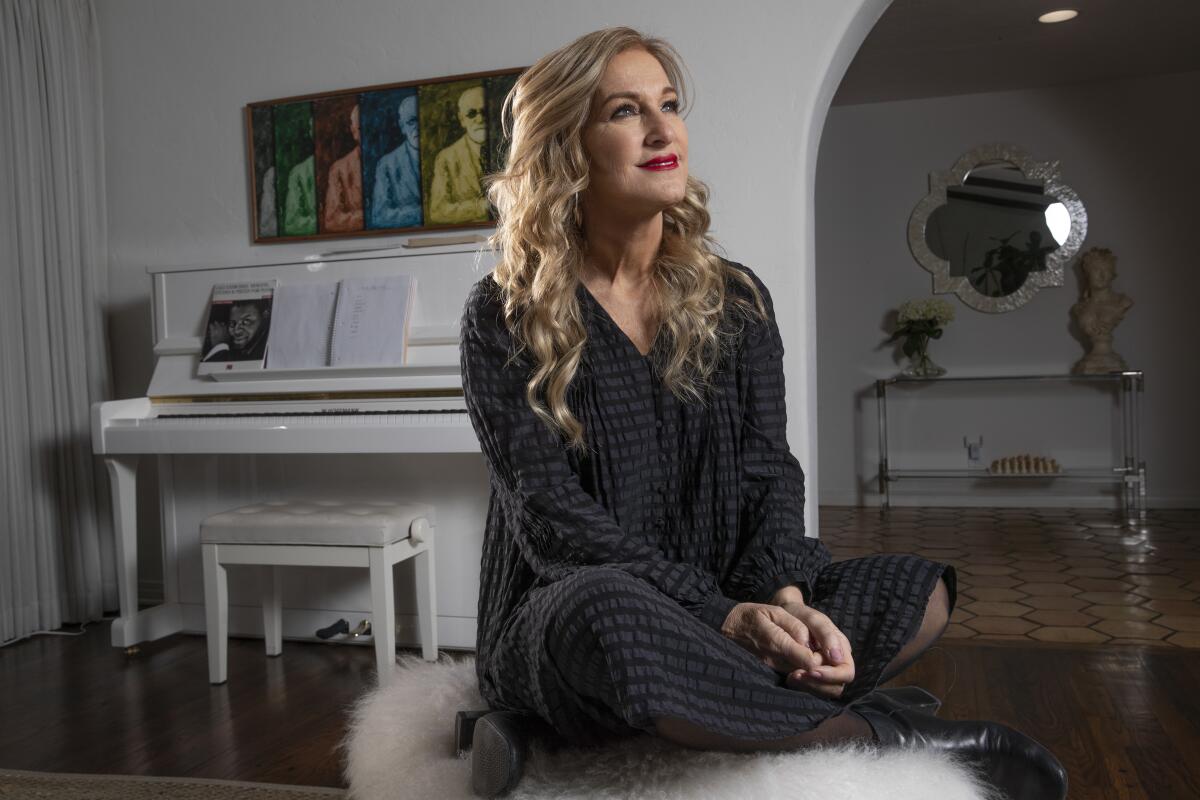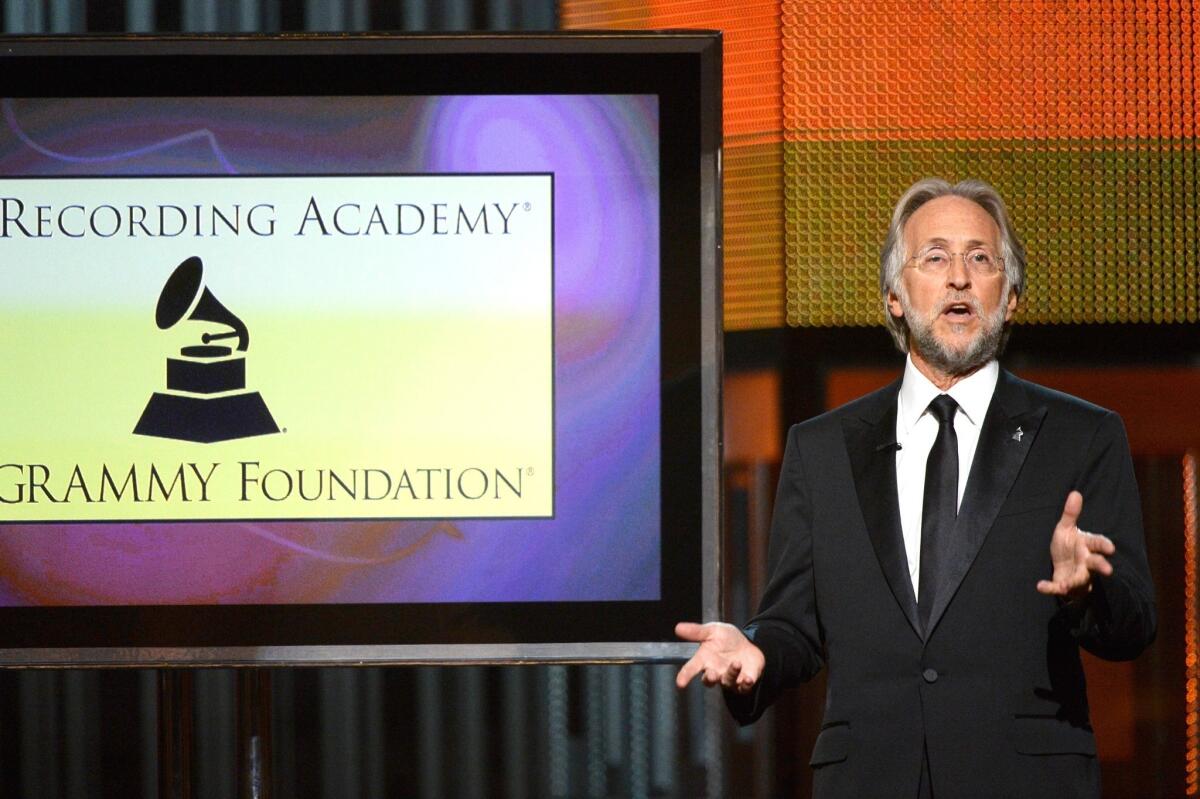On eve of Grammys, ousted CEO Deborah Dugan has no regrets: ‘I had to defend myself’

- Share via
The ousted Recording Academy executive whose allegations of voting irregularities and other improprieties at the organization have called into question the integrity of the Grammy Awards said turmoil was the last thing she ever wanted.
“The ceremony is about the musicians and the fans. I don’t want to taint that,” Deborah Dugan, 61, said Saturday in an interview from her home in Santa Monica. “This is about the Recording Academy. The Recording Academy must change. To bring the Grammys down because of a few bad eggs [at the academy] wouldn’t be fair to the artists.”
Nevertheless, Dugan’s bombshell complaint against the academy, its board of trustees and some key aspects of the mechanisms that yield the nominees and winners has threatened to do just that: to bring down “music’s biggest night,” as the academy and CBS have branded the Grammys, whose 62nd edition takes place Sunday.
Though the Grammy Awards have often favored the middlebrow over risk-takers, and historically honored white men in alarming proportion, a Grammy remains the music industry’s highest accolade, a peer-bestowed honor that can forever distinguish and elevate recipients’ careers.
Dugan spoke in depth with The Times about the circumstances that led to her being placed on administrative leave just 10 days before the 2020 Grammys, and her subsequent filing of a harassment and retaliation complaint with the federal Equal Employment Opportunity Commission.
“This is not something I would bring on myself and try to grab the limelight right before the Grammys,” she said. “But I feel like there was a series of events, that I had to defend myself.”
The 44-page complaint, made public Tuesday, outlined in extensive detail her first months as president and chief executive of the 62-year-old organization, which left her convinced that substantive changes are necessary. She alleged discovering voting irregularities, financial mismanagement, self-dealing and conflicts of interest among board members and nomination review committees, and criticized what she called “exorbitant” legal fees paid to a few law firms with close ties to the academy.
The focus not just of Dugan’s recent allegations but also of long-standing debate within the music community are the review committees charged with curating many, but not all, awards categories.
In the Grammys process, 13,000 voting members cast ballots on thousands of eligible recordings submitted for consideration. The top 20 vote-getters are then pared down to five nominees — eight in the case of the four highest-profile categories of record, album, song and new artist, which are deliberated on by a so-called blue-ribbon committee. Nominations are given back to the voters, who select the winners.
But the review process has been criticized for being subject to lobbying or favoritism from committee members. Additionally, board members or the academy president have the ability to add nominees from outside the top 20 if they believe a worthy candidate has been overlooked. “This year, 30 artists that were not selected by the membership were added to the possible nomination list,” Dugan’s complaint stated.
She further specified that among the current contenders for song of the year, one nominee, who was not identified, placed 18th of 20 in the membership’s voting but was elevated into the final eight through the add-on mechanism. That artist not only sat on the nomination committee, Dugan said, but also is represented by a member of the academy’s board.
“As a result, it is not surprising that many high-caliber artists who could have taken home the award in a specific category have, at times, not been nominated at all,” Dugan’s complaint stated. “For instance, Ed Sheeran and Ariana Grande, who had been voted for by the membership, missed out on nominations in the 2019 ‘Song of the Year’ category in part because the aforementioned artist who ranked 18 out of 20 was nominated instead.”
Dugan declined to elaborate on which artist or artists were included in place of Sheeran and Grande but added: “If the membership is right, it should be that the voting comes out better. I would have in time changed the voting system.”
Academy representatives declined to comment Saturday about Dugan’s interview, but earlier this week, chief awards officer Bill Freimuth defended the integrity and transparency of the awards process. “Voting members make their choices based solely on the artistic excellence and technical merits of eligible recordings,” he said in a statement.
The review committee process was instituted some two decades ago as a mechanism to avoid embarrassing results such as the choice of English progressive folk-rock band Jethro Tull over Metallica as the recipient of the Grammys’ inaugural hard rock/metal award in 1988, or the 1990 new artist Grammy to pop duo Milli Vanilli, who subsequently confessed to lip-syncing to tracks created by studio musicians and singers.
Over time, many have complained that the cure represented by the nomination review committees, consisting of a small number of experts in each category, has become worse than the disease. That has driven growing sentiment to eliminate the review committees or at least make the process more transparent.
The Times has reviewed internal correspondence from at least one Grammy-winning musician and two board members who lodged concerns in writing over the conflicts of interest within the review committees.
“I’m sure you’ve read,” one board member wrote, “about the nom[inating] committees. I couldn’t agree more with their assessment of our system. It’s broken, we should admit and fix it…. I hope we will make it a priority to work on this issue.”
A Grammy-winning jazz musician and 20-year academy member wrote: “I know for a fact that artists who have recordings up for awards in a given year are still a part of the selecting committee for that year. I understand these folks must excuse themselves and leave the room when their recordings are up for voting, but minutes later they are back in the room with the same folks, voting for other recordings.”
“Shame on [the academy] for not trying to better represent the music community,” Dugan told The Times, “and that the course correct they came up with was these secret committees.”
The most explosive charge in Dugan’s EEOC filing was a sexual harassment allegation against prominent entertainment lawyer Joel Katz, who serves as the academy’s general counsel and is a past chairman of the board. He has denied engaging in the behaviors Dugan described in her filing.

She also cited a previous allegation of sexual assault against her predecessor, Neil Portnow, raised before her tenure by a female recording artist and academy member. Portnow said that the allegation is “ludicrous and untrue” and that an internal investigation of the complaint “completely exonerated” him.
Dugan did not address the harassment claim against Katz or the incident involving Portnow on Saturday, focusing instead on process issues she believes the academy needs to address.
Initially, she said she had no intention of airing those concerns immediately ahead of Sunday’s award show. She said a complaint lodged with the academy’s board against her by director of administration Claudine Little, who had served as Portnow’s executive assistant for most of his 17-year tenure as president and CEO, was to be explored internally.
On Jan. 16, the academy issued a statement saying she was being placed on administrative leave because of misconduct toward “a senior female member of the Recording Academy team,” who later was identified as Little.
“I found myself in a situation I never would have imagined,” Dugan said. “I’m reading headlines like ‘Deborah Dugan ousted for misconduct’ and that two investigations are going on. For the rest of my life, whatever I do, that will be pulled up.
“It’s been eight weeks” since Little lodged her complaint, she continued. “They haven’t interviewed the HR consultant, they haven’t interviewed me. They are dragging this out so they can keep an investigation open.”
She didn’t minimize the gravity of the misconduct allegation against her, or her harassment and retaliation charges against the academy, but cited the systemic issues within the Recording Academy as her focal point.
“It’s become a movement to create change,” she said. “Those who have jumped on board for support also believe that change must happen. If I could be a catalyst for change … if I could be that first crack, maybe things will be different for my daughter. So I find I’m OK through all this madness. But this is something I wouldn’t have wished on anybody. It’s very hard.”
She has asserted that the Recording Academy is “an old boys’ club,” signaled to her early on by the fact that the compensation she was offered was significantly less than not only that of her immediate predecessor, Portnow, but also that of his predecessor, Mike Greene, 17 years earlier.
Given the pay disparity and the alleged sexual harassment that took place before her official start date of Aug. 1, Dugan was asked why she chose to take the job at all.
“It’s a good question,” she said. “I did it because I felt I was uniquely situated for this job. I had a really optimistic, on-fire feeling. Yes, people told me it’s an old boys’ club, there are problems with governance and all those things…. Maybe I’m a ridiculous idealist, but I had Bono as a boss,” referring to her previous post heading up the U2 singer’s AIDS organization Red.
“I thought I could make a difference,” Dugan said. “There are good people at the Recording Academy, and good people on that board, and they deserve better.”
Much of Dugan’s complaint echoes the findings of the Recording Academy’s own diversity and inclusion task force, launched in March 2018 after Portnow stepped on a public-relations land mine when he stated backstage after the 2018 Grammy Awards that female artists needed to “step up” to achieve parity with their male peers, who have long dominated the nominations and awards.
Portnow subsequently announced he would not seek an extension of his contract that expired July 31, 2019.
The task force, headed by former First Lady Michelle Obama’s chief of staff Tina Tchen, spent more than a year examining “conscious and unconscious bias” related to gender and race within the music business in general and the Recording Academy in particular.
Its final report, issued in December, cited a systemic lack of diversity among the academy’s 25,000-strong overall membership, the 13,000 voting members, the 40-member board of trustees and the nomination review committees.
The task force made 18 recommendations for changes it said would make the academy more transparent and bring greater integrity to the awards, including a revamping of the nominating committees to better reflect the gender and racial makeup of the broader music community.
“Thanks to Tina and the task force, the academy has already started fixing things and the membership has been getting better and better,” Dugan said. “I was so optimistic. They had worked for a year and a half, and they had done all the hard work. For me it was a nonissue: Of course we should be doing these things. They should have been done 20 years ago.”
Ultimately, Dugan said, she still believes in the music community and wishes to see it better served by the Recording Academy.
She said she expects she will watch Sunday’s ceremony, probably at home with her immediate family.
“It’s just such a culture of secrecy, of secret meetings and secret committees,” she said. “I had done a presentation at the board meeting in November where I said, ‘Let’s go from secrecy to transparency, from feeling like a castle to feeling of the people, from feeling elite to being of service.
“It’s time that happened.”
More to Read
The biggest entertainment stories
Get our big stories about Hollywood, film, television, music, arts, culture and more right in your inbox as soon as they publish.
You may occasionally receive promotional content from the Los Angeles Times.










